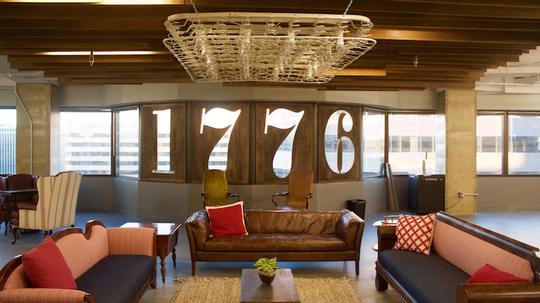
On Wednesday, 1776 celebrated the launch of its new Crystal City campus. 1776 Crystal City, as the new space is aptly named, follows the acquisition of Disruption Corporation, which officially closed in August. Now, the freshly renovated incubator will serve as a second home for D.C.-based 1776, part of its expanding footprint that also includes the acquisition of startup studio Hattery in San Francisco in April. All this just as the third Challenge Cup kicks off a round-the-world pitch competition.
I sat down with 1776 co-founder Donna Harris to talk about the new space, the Challenge Cup competition and 1776's role in the local startup and entrepreneurship scene.
DC Inno: Why does 1776 need another campus, what role does it serve?
Donna Harris: Opening the Crystal City campus gives us new scope for serving our members and attracting new ones. There's no shortage of problems to be tackled by startups and [the new campus] gives them another hub to work from.
DC Inno: What kind of changes come from 1776 taking over from Disruption? Do you foresee any problems with it being so dominant in some ways in the local startup ecosystem?
Harris: Different organizations serve different needs. What we do is different from WeWork, we're a hub, not a co-working space. And there are more startups [being founded] all the time. We've barely scratched the surface of possibilities in the region. We're trying to broaden the horizons in every direction.
"We've barely scratched the surface of possibilities in the region."
DC Inno: There does seem to be a global focus on the Challenge Cup. What's different about this third year compared to the last two?
Harris: This year we've made it as global as possible. We're having competitions in places like Tehran. Last year we had two levels of [competition], with the winners of the local competitions coming here. This year we're holding 45 local competitions, one to two a week through January, and then nine regional events where the [local winners] will compete. Then we'll have the Challenge Festival here next year for the finals. I'll be going to a handful of the local ones.
DC Inno: It must have added to the complications to make it bigger, was it easy to sell the investors and other stakeholders on making it even more comprehensive?
Harris: We definitely had to stop and ask ourselves if it was worth it, but everyone was on board. There were some geopolitical issues to putting it together. Getting visas for Tehran, Beijing and Islamabad was an effort. For year three we wanted to leave no stone unturned. We don't want geography to be the issue stopping entry. In the end we we had over 100 cities engage with us.
"We're building a bridge to both sides of the country."
DC Inno: Where does Hattery and the $12.5 million fund you recently closed fit into 1776's future
Harris: It's very hard to open doors in Silicon Valley without a presence there. Venture capital is a real issue, a third of all VC deals happen in [Silicon] Valley. With Hattery, with our fund, we can bring our members [into contact] with that money. At the same time, we are bringing the benefits of [understanding] how D.C. and the regulatory system works to them. Entrepreneurship is hard and we are trying to teach the benefits of all our different lenses. We're building a bridge to both sides of the country.




